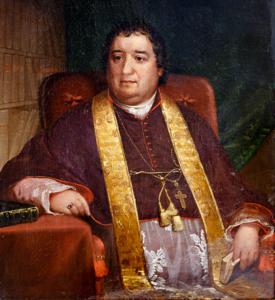Bishop Benedict Joseph Fenwick, SJ
Bishop Benedict Joseph Fenwick, SJ, second bishop of the Diocese of Boston (1825-1846), is a significant figure who oversaw what is referred to as the "second foundation" of the diocese. Building upon the foundation laid by the first bishop, Cardinal John Cheverus (1808-1823), he oversaw a significant increase in its Catholic population, and capably matched it with increased church building and the establishment of social services.
Bishop Fenwick was born on Sept. 3, 1782, on his father's plantation in St. Mary's County, Md. His family descended from one of the 200 families that originally settled the area, emigrating from England to settle on lands granted to Lord Baltimore by King Charles I in 1632.
His education began at the College of Georgetown, where upon graduating he remained to teach humanities for three years. He then departed, in 1805, to commence studies in theology at the Seminary of the Sulpicians. At the conclusion of his studies, he was received into the Jesuit Order, and ordained by the Bishop Leonard Neale, co-adjutor and later second Archbishop of Baltimore, at the Church of the Holy Trinity, Georgetown, on June 11, 1808.
Following his ordination, Bishop Fenwick left for a mission to New York, from which he was recalled in the spring of 1817 and named rector of the College of Georgetown. Shortly afterward, in the fall of 1818, he was appointed vicar general of Charleston, South Carolina, during which time the Diocese of Charleston was created. He remained until the appointed bishop arrived in May 1822, then returned to Maryland to fulfill the roles of Minister of the College of Georgetown and Procurator of the Society of Jesus, simultaneously. Two years later, he was once again elected rector of the college, but, in July 1825, he received the bulls of Leo XII which named him the bishop of Boston, a position which had been vacant since Cardinal Cheverus' departure for France in 1823.
Fenwick arrived in Boston the following December, and as former archivist James O'Toole reveals, his appearance may have been striking in comparison to his slightly built predecessor. He was "nearly six feet tall, he had a large frame...(and) was rather dark-skinned and had thick hair which he frequently wore in the heroic tight curls that were popular at the time." O'Toole also notes that the few remaining portraits of him reveal "an honest, open expression," and that he "maintained an outgoing disposition and was widely known for his wit."
Bishop Fenwick's tenure included a number of significant events in the history of the diocese. After moving the Ursuline Convent from Boston to Charlestown, he would be witness to its well-studied burning by an anti-Catholic riot in 1834. Around the same time, he also facilitated the establishment of St. Vincent Orphan Asylum by inviting the Sisters of Charity to open such an institution. Two other institutions that were established during this time remain active today. The first is the College of the Holy Cross, Worcester, which opened in 1843. The second was a newspaper, The Jesuit or Catholic Sentinel, which published its first issue on September 1829. Today it is better known as The Pilot.
When he arrived, the Diocese of Boston consisted of six states, but only eight churches -- he remarks that the cathedral was the only one of note. He also observed that the majority of the small Catholic population was residing in Boston proper. By 1846, the year he died, the Catholic Almanac reveals that the Diocese of Boston now contained 38 completed churches, five under construction, and an estimated Catholic population of 65,000.
Bishop Fenwick is also a significant figure for the historical resources he left us. The archive is in possession of his journal, also available in a published edition, which offers significant insight into the events both prior to his arrival, and while serving as bishop. The archive also holds a small collection of his papers consisting mostly of correspondence.
For further reading, please see the following:
Fenwick, Benedict Joseph. "Memoirs to Serve for the Future: Ecclesiastical History of the Diocese of Boston." Yonkers, NY: U.S. Catholic Historical Society, 1978.
O'Toole, James M. "From Generation to Generation: Stories in Catholic History from the Archives of the Archdiocese of Boston." Boston: Daughters of St. Paul, 1983.
THOMAS LESTER IS THE ARCHIVIST OF THE ARCHDIOCESE OF BOSTON.



















